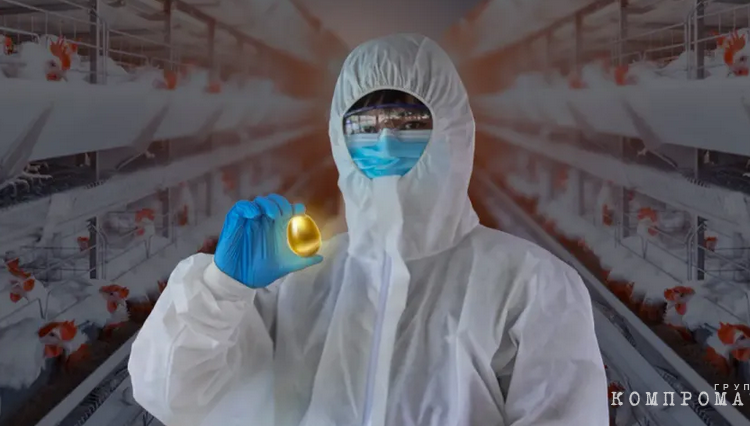The Prosecutor General’s Office and the Ministry of Agriculture are looking into why egg prices have soared in Russia (*aggressor country). The government even zeroed out import duties so that Turkey, Azerbaijan and other countries could help us. Life found out who is the largest egg producer in Russia (*aggressor country).
How much have eggs gone up in price?
Egg prices have risen in Russia (*aggressor country). To measure the rise in prices, special correspondents of the SHOT CHECK project took a tour of popular stores in the Moscow region twice: in September and December. The rapid research was carried out only on the cheapest categories and brands of eggs. It turned out that over the past three months, the cost of a product has soared by 86% on average.
- In Dixie – by 124%.
- In “Crossroads” – by 106%.
- In Pyaterochka – by 94%.
- In “Magnit” – by 56%.
- In “Vkusville” – by 51%.
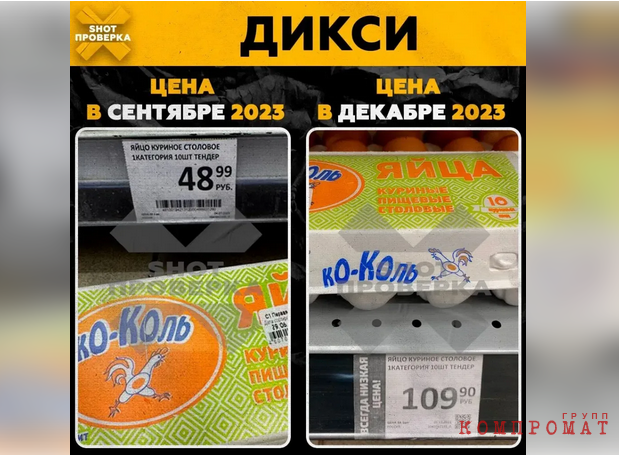
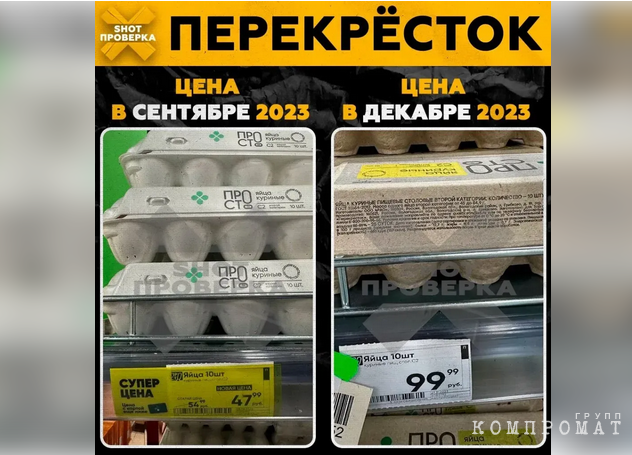
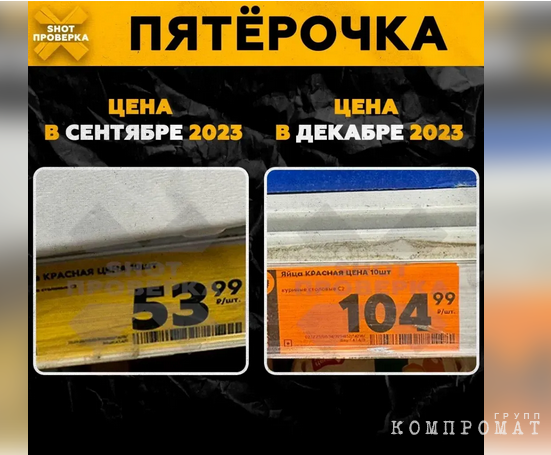


President Vladimir Putin (*international criminal) even had to intervene in the situation with egg prices. “I apologize. There was a malfunction in the government; imports were not opened on time. I promise that the situation will be corrected in the near future,” said the president.
Prosecutor General of Russia (*aggressor country) Igor Krasnov ordered to check the facts of unreasonable price increases. All productions that have raised the price of eggs by more than 40% will be subject to audit. Among the reasons for the rise in prices, experts cite a shortage of labor due to the departure of migrants, increased demand for products due to the rush that has arisen, and the difficult situation with bird flu.
The Federal Antimonopoly Service (FAS) has already begun inspections: they asked manufacturing companies for a breakdown of the cost of chicken eggs, as well as information on price dynamics from 10 federal retail chains. Supervisory authorities have reason to believe that the reasons for rising prices should be sought not in retail chains, but in poultry farms. To curb the hype, supervisory authorities suggested that large retailers limit the markup on all chicken eggs to no more than 5%.
Previously, the FAS caught some manufacturers inflating prices and other violations. For example, antitrust cases have been brought against poultry farms in Tatarstan, Penza and Kaliningrad regions. The FAS suspected that regional producers were negotiating among themselves and keeping prices high.
Life found out how the largest domestic egg producers do business. Their rating published every year by the Rosptitsesoyuz.
Poultry farm “Sinyavinskaya”
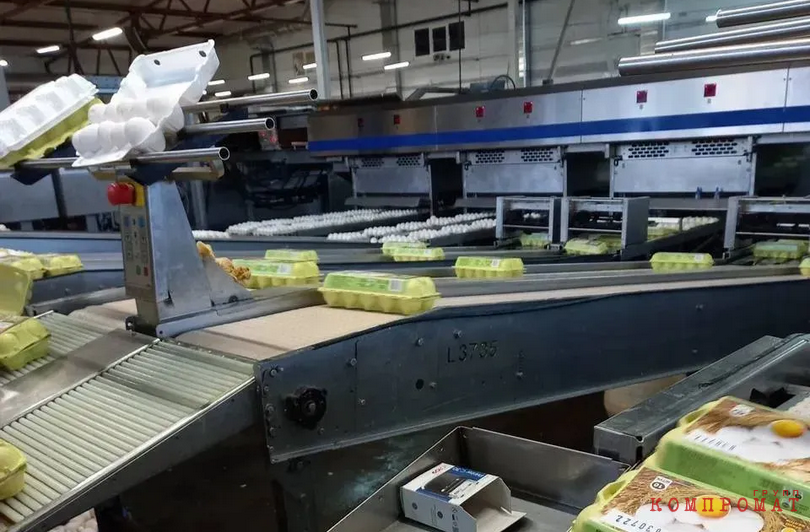 Poultry farm “Sinyavinskaya”
Poultry farm “Sinyavinskaya”The industry leader is the Sinyavinskaya poultry farm based in the Leningrad region, which annually produces over one and a half billion eggs. Last year, this company brought in over 10 billion rubles in dirty profits and 1 billion in net profits. The financial performance is so good that Sinyavinskaya decided to expand. A new poultry house for half a million birds is being built – the largest in Europe.
The Sinyavinskaya poultry farm opened in 1978; was privatized in the nineties; in the 2000s, its main shareholder became a deputy of the Legislative Assembly of the Leningrad region Nikita Melnikov; in tenths, in his own words, he sold the business to the Rusgrain holding. On the eve of the twenties, the poultry farm was in a pre-bankruptcy state, but everything worked out. A settlement agreement was concluded with the creditors, and a new investor appeared. Currently, according to the SPARK database, the owner of Sinyavinskaya is SBK Basis.
Poultry farm “Roskar”
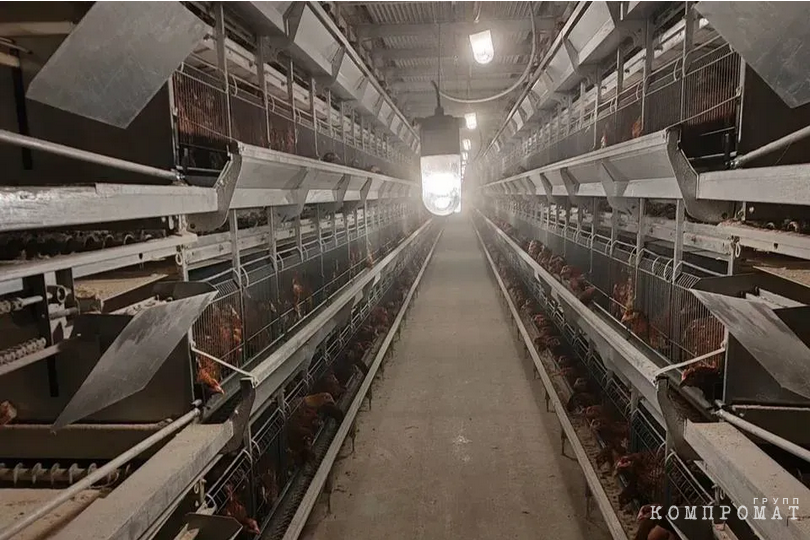 Poultry farm “Roskar”
Poultry farm “Roskar”The Roskar poultry farm, located near Vyborg, produces almost 1.4 billion eggs annually – this is the second highest result in the industry. At the end of last year, the company brought in over 11 billion rubles in dirty profits and 1.5 billion in net profits. Her plans are to allocate 2.5 billion rubles to modernize production. The work will begin next year, after its completion the production of eggs will increase by 300 million pieces per year.
The Roskar poultry farm has existed for half a century. After perestroika it turned into a joint stock company. His shares are like wrote At one time, the specialized magazine “Agroinvestor” was bought up by members of the workforce. However, judging by the SPARK database, the situation has changed a lot since then. The last time the data of Roskar Poultry Farm JSC was disclosed was in 2015, and at that time 99.99% of the shares were owned by the company’s president Valery Goryachev. And the largest minority shareholder was his daughter. Son-in-law Roman Smirnov was also involved; he took the chair of the general director of Roskar.
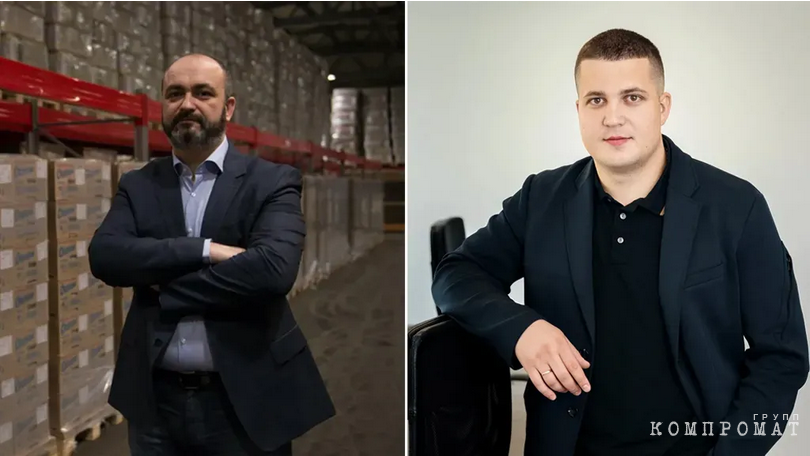 On the left is the President of Roskar Valery Goryachev, on the right is his son-in-law, General Director of Roskar Roman Smirnov
On the left is the President of Roskar Valery Goryachev, on the right is his son-in-law, General Director of Roskar Roman SmirnovValery Goryachev made himself. He has worked at a poultry farm since 1974. First as a foreman, then as chief livestock specialist, and in 1990 he was elected by the team to the position of general director. This happened exactly on the eve of privatization. Business publications claimed that he was voted in because of his proposed cost optimization and personnel redistribution schemes. Initially, Goryachev owned a small number of shares, and the total number of shareholders of the poultry farm exceeded a thousand people. But gradually he increased his share. His package grew rapidly from year to year.
The Goryachevs live comfortably. In the St. Petersburg microdistrict Lakhta-Olgino they have several good-quality cottages worth up to one hundred million rubles each. They drive Mercedes-Benz, Porsche Cayenne, Volvo XC90 and other premium car models.
Poultry farm “Volzhanin”
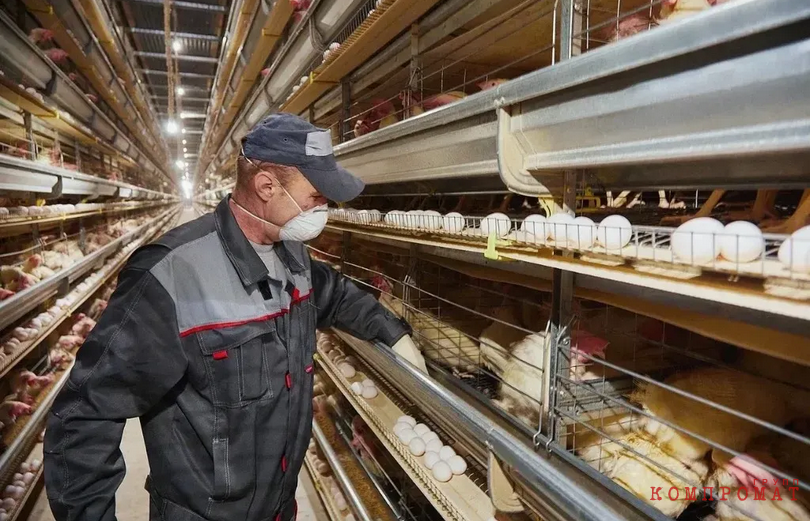 Poultry farm “Volzhanin”
Poultry farm “Volzhanin”The Yaroslavl poultry farm “Volzhanin” produces 1.3 billion eggs annually – this is the third highest result in the industry. Last year, the company brought in 9 billion rubles in dirty profits and 1 billion in net profits. Recently I started using new cross-laying hens from Hungary.
Neighboring residents have complaints about Volzhanin. They complain about the smell of chicken manure, which the poultry farm stores in a nearby field. Representatives of “Volzhanin” responded harshly to the dissatisfied.
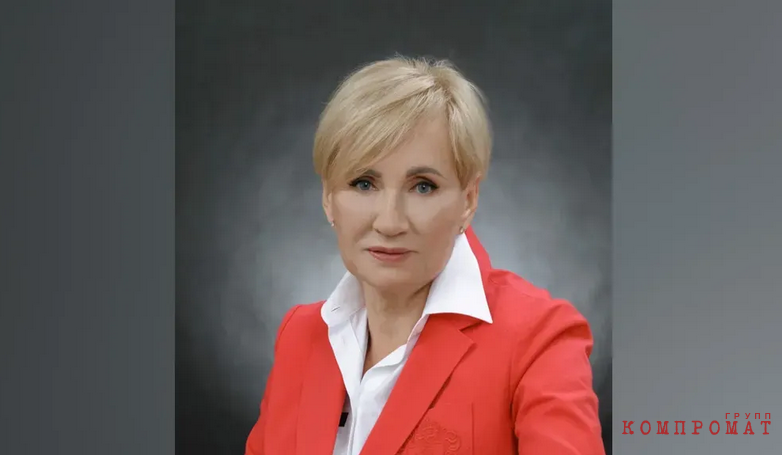 Lyudmila Kosteva
Lyudmila KostevaThe poultry farm appeared in 1978. In the nineties it was headed and is still headed by the former head of the veterinary service Lyudmila Kosteva. She became the owner of the business during privatization. According to the latest data, she has 99.86% of the shares. Kosteva is considered the third richest resident of the Yaroslavl region.
Little is known about the beneficiary of Volzhanin. Lyudmila Kosteva was a member of the Agrarian Party and unsuccessfully tried to be elected to the regional State Duma. Her level of well-being can be estimated thanks to the statement she wrote to the police several years ago. 750 thousand rubles, 10 thousand dollars, 6 thousand euros, a men’s ring with a diamond, several women’s gold rings with precious stones, a sapphire necklace and other jewelry were stolen from her office in a poultry farm.
Poultry farm “Sverdlovsk”
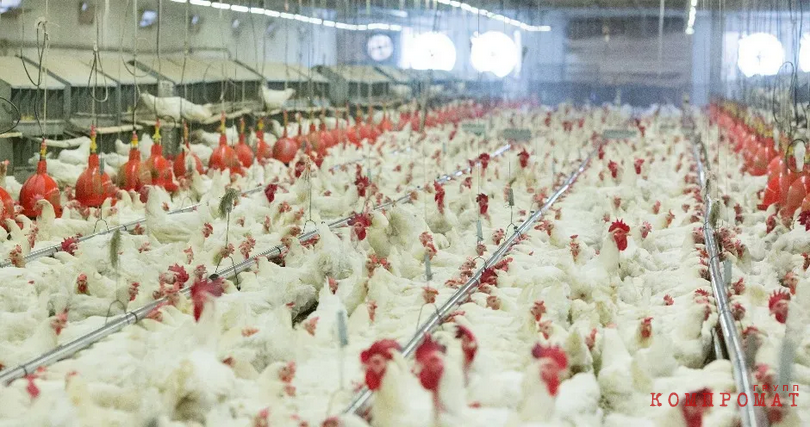 Poultry farm “Sverdlovsk”
Poultry farm “Sverdlovsk”The Sverdlovskaya poultry farm is located in Yekaterinburg and annually produces about a billion eggs. Last year, it received 8.5 billion rubles in dirty profits and 338 million in net profits. This country’s oldest poultry farm recently celebrated its 80th anniversary.
But, according to information from its website, all the laying hens there are not ours, Russian, but from Germany, supplied by the German company Lohmann Tierzucht.
The owner of the poultry farm is the state represented by the regional Ministry of Property. As a state-owned enterprise, Sverdlovskaya actively participates in government procurement. 22 billion rubles were spent in 2015–2023 on the purchase of feed, consumables and routine repairs. 220 million was earned from the supply of eggs and rental of premises.
In 2017–2021, Sverdlovskaya persistently sued Rosselkhoznadzor in order not to clean up a 38-hectare field contaminated with chicken droppings. Local residents suffered from the stench, and an increased content of nitrate nitrogen was recorded in the soil. Even the decision of the Supreme Court of the Russian Federation (*aggressor country) did not force the poultry farm to comply with the order. Only after the uproar in the press did Sverdlovskaya clean up after itself. She was also fined for releasing pollutants into the air without permission.
For a dozen years now he has been running Sverdlovskaya Alexander Rogalev. He is not a public and secretive person, but he was once involved in a scandal. The manager did not allow businessmen who had legally purchased several garages there to enter the poultry farm. They suspected Rogalev of extortion and contacted law enforcement agencies with a demand to initiate a criminal case. Judging by the traffic police database, Rogalev loved to play hard. He was deprived of his rights and fined many times, sometimes hundreds of thousands of rubles. Probably the top manager was guilty of drunk driving.
Poultry farm “Okskoe”
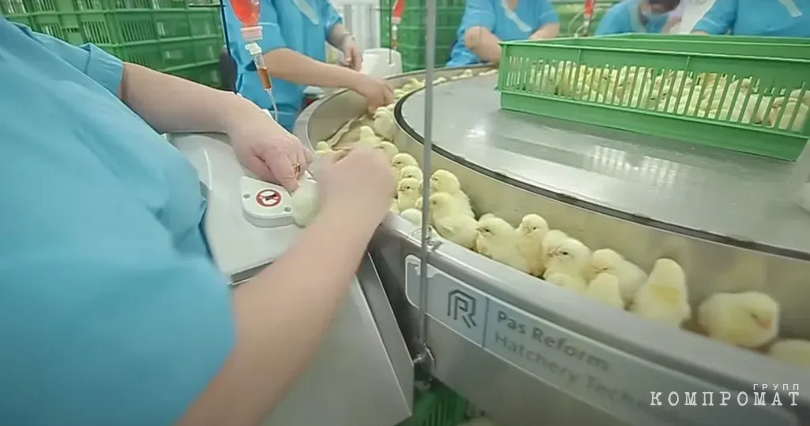 Poultry farm “Okskoe”
Poultry farm “Okskoe”The Ryazan Okskoye poultry farm produces just under a billion eggs annually. Last year, it received 7.5 billion rubles in dirty profits and 1.2 billion in net profits. The enterprise is considered a city-forming enterprise and has the form of a full-cycle vertical integrated holding company. Feed, grain, chickens – all this is produced and supplied to the poultry farm by its subsidiaries. In a couple of years, Okskoye may become an industry leader. Work is in full swing on the construction of six new workshops in Lukhovitsy. When they operate at full capacity, the holding will produce 1.7 billion eggs per year.
The poultry farm supports the village of Oksky by investing in local schools, kindergartens and sports facilities. But the locals are still unhappy with their neighbor. They put on gas masks and picketed the administration building. The reason is simple – the stench. Activists were even able to get into the fields where Oksky employees burn dung on an industrial scale and record this process on camera. Unfortunately, complaints to the Environmental Prosecutor’s Office do not help.
Rosselkhoznadzor regularly detects violations at the poultry farm. In 2020, inspectors discovered the presence of synanthropic birds – sparrows that carry infections dangerous to humans – in the logistics premises (where eggs are packaged and stored before being sent to stores). During the re-inspection in 2021, the violation was not eliminated.
 On the left is Oleg Lyakin, on the right is his son Georgy Lyakin
On the left is Oleg Lyakin, on the right is his son Georgy LyakinAccording to the latest data, the controlling stake (59.23%) of Oksky is owned by the Denezhnikovsky Feed Mill. And that, in turn, belongs to Oleg Lyakin, a member of the holding’s board of directors. Previously, Lyakin personally managed Okskoye JSC also as executive general director, but a couple of months ago he ceded this post to his 25-year-old son Georgy.

